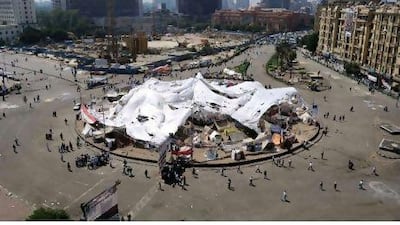CAIRO // Egypt replaced some members of the cabinet yesterday in response to demands from protesters who have held sit-ins for almost two weeks to press for faster changes.
Hazem El Beblawi, an economist and an adviser for the Arab Monetary Fund, was named as finance minister, replacing Samir Radwan, and will also serve as the deputy prime minister. Other new appointees include Ali Ibrahim Sabri as minister of military production, and Mahmoud Eissa as the trade and industry minister.
More than a dozen ministers were changed in the cabinet sworn in yesterday, according to a list distributed to reporters in Cairo. Those who kept their posts include the oil, interior, tourism and justice ministers. The changes come after a revival of protests, with many camped out since July 8 in Tahrir Square, the centre of the uprising against the ousted Hosni Mubarak.
Demands include a new government with more powers, the prosecution of former officials accused of corruption and in the killing of demonstrators, and an end to military trials of civilians. Some protesters also call for the removal of the public prosecutor.
Ahmed Maher, the general coordinator for the April 6 Youth Movement, which helped coordinate anti-Mubarak protests, said yesterday: "We want ministers and governors who have no ties to the former ruling party," which has been dissolved. "I support having the sit-in continue until all the demands are met."
Field Marshal Mohamed Hussein Tantawi, the head of the Supreme Council of the Armed Forces, urged the cabinet to work to restore security and stability, the state-run Middle East News Agency said. He also called for legal action against those who were involved in "corrupting political life."
The swearing-in ceremony for the cabinet members, originally scheduled for July 18, was delayed amid objections over some candidates and by medical tests for the prime minister, Essam Sharaf.
A coalition of protesting groups, the Alliance of the Youths' Revolution, said in a statement that it was "giving a chance to the cabinet reshuffle," while demanding "the full cleansing of ministries in which the consultations indicated that symbols of the former regime may remain at the helm."
The cabinet reshuffle may take some of the steam out of protests, though it probably won't result in policy changes, Mustapha K. Al Sayyid, a professor of political science at Cairo University, said. The new ministers are "not known to be adopting a different approach" and have "a very short time to undertake any fundamental change," he said.

